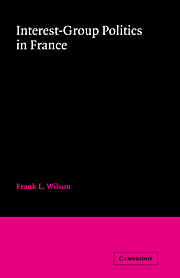Book contents
- Frontmatter
- Contents
- List of figures
- List of tables
- Acknowledgements
- 1 Introduction
- 2 Alternative views of interest-group politics in western democracies
- 3 Interest groups and politics: the non-occupational groups
- 4 Major interest groups: the occupational groups
- 5 Structures of interest-group politics
- 6 Interest-group actions
- 7 Interest-group leaders' attitudes toward interaction with government
- 8 The place of interest groups in French politics
- 9 The French experience and interest-group theory-building
- 10 Conclusions: interest groups and representative democracy in France
- Appendix A Questionnaire
- Appendix B List of groups included in interview sample
- Notes
- Index
6 - Interest-group actions
Published online by Cambridge University Press: 05 January 2012
- Frontmatter
- Contents
- List of figures
- List of tables
- Acknowledgements
- 1 Introduction
- 2 Alternative views of interest-group politics in western democracies
- 3 Interest groups and politics: the non-occupational groups
- 4 Major interest groups: the occupational groups
- 5 Structures of interest-group politics
- 6 Interest-group actions
- 7 Interest-group leaders' attitudes toward interaction with government
- 8 The place of interest groups in French politics
- 9 The French experience and interest-group theory-building
- 10 Conclusions: interest groups and representative democracy in France
- Appendix A Questionnaire
- Appendix B List of groups included in interview sample
- Notes
- Index
Summary
For most French interest groups, politics is only one of many activities. There is abundant evidence from the study of interest groups in other settings that the organization and continued vitality of groups depend heavily upon other motives than the urge to represent interests before government policy-makers. While there have been few attempts to study this empirically in France, my observations indicate that many groups are at least as concerned and often more concerned with the providing of material benefits and social interaction for their members than with political action. Trade unions devote most of their attention to aiding their members in increasing their wages and benefits; medical associations provide technical information and advice; veterans' groups offer social activities as well as practical help for those who encounter problems in obtaining their state pensions. Such practical and usually non-political activities are vital to the organizations' ability to attract and retain members. They are usually easier to deliver than are most abstract political goals. It is also easier to demonstrate the group's role in obtaining them than it is to show that even concrete pay-offs from government policies are the product of the group's activity and not the natural or self-interested beneficence of the politicians themselves. These non-political services can also be restricted to members only while the government policy changes cannot be withheld from “free riders.”
For nearly all interest groups, the tasks of maintaining the organization absorb much of the time and energy of their staffs. This is especially true in a country where so many groups compete for the same potential membership. As we have seen in the previous chapter, French interest groups are not very powerful structures.
- Type
- Chapter
- Information
- Interest-Group Politics in France , pp. 149 - 178Publisher: Cambridge University PressPrint publication year: 1988



